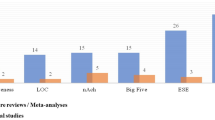Abstract
Using survey data from a large public research organization, this study examines entrepreneurship propensities of academic researchers, focusing on gender differences. Although sample means of female and male propensities toward entrepreneurship are fairly similar, regression estimates show significant gender differences in the association of several factors with propensities to start businesses. In particular, prior record of researchers’ patenting and institutional leadership promote tendencies towards entrepreneurship among male researchers, but not among female researchers. Also, unlike the male scientists, doctoral degrees and preference for open access of research results do not significantly influence the entrepreneurial attitudes of female researchers. The results for the full sample are similar to those for the male subsample, with a negative coefficient on the variable identifying females.
Similar content being viewed by others
Notes
Bozeman et al. (2013, p. 8) note in their review that, “Gender is obviously one of the most personal and salient issues in one’s life”.
In addition to the female scientists who engage in commercialization of science, scholars have called for research on the following sub-groups: (1) Female serial/habitual/portfolio entrepreneurs, (2) female corporate entrepreneurs, and (3) women who act entrepreneurially in family business (see Jennings and Brush 2013).
The literature focusing on entrepreneurship by university researchers (who have to balance the demands of teaching and research) can be seen complementary to that focusing on entrepreneurship by other academics.
See Max Planck Institute (2009) for details about the organization and the survey.
While positive entrepreneurial tendencies are likely to be positively correlated with actual entrepreneurship, we do not have the benefit of a follow-up survey regarding how many of the respondents did over time actually become entrepreneurs. Also, given appropriate data, one could incorporate the probability of commercialization (see Link and Ruhm 2009).
See Link and Ruhm (2011) regarding differences in patenting propensities between academic and business entrepreneurs.
As the reader is likely aware, the respective coefficient in probit signify probabilities, rather than marginal effects.
Details are available upon request.
Details are available upon request.
References
Allen, S. D., Link, A. N., & Rosenbaum, D. T. (2007). Entrepreneurship and human capital: Evidence of patenting activity from the academic sector. Entrepreneurship Theory and Practice, 31(6), 937–951.
Audretsch, D. B. (2000). Is university entrepreneurship different? mimeograph. Bloomington: Indiana University.
Audretsch, D. B. (2007). The entrepreneurial society. Oxford: Oxford University Press.
Baumol, W. J. (1990). Entrepreneurship: Productive, unproductive, and destructive. Journal of Political Economy, 98(5), 893–921.
Baumol, W. J. (2010). The microtheory of innovative entrepreneurship. Princeton: Princeton University Press.
Bercovitz, J., & Feldman, M. (2008). Academic entrepreneurs: Organizational change at the individual level. Organization Science, 19(1), 69–89.
Bozeman, B., Dietz, J. S., & Gaughan, M. (2001). Scientific and technical human capital: An alternative model for research evaluation. International Journal of Technology Management, 22(7/8), 716–740.
Bozeman, B., Fay, D., & Slade, C. P. (2013). Research collaboration in universities and academic entrepreneurship: The-state-of-the-art. Journal of Technology Transfer, 38(1), 1–67.
Bozeman, B., & Gaughan, M. (2011). How do men and women differ in research collaborations? An analysis of the collaboration motives and strategies of academic researchers. Research Policy, 40(10), 1393–1402.
Chukumba, C., & Jensen, R. (2005). University invention, entrepreneurship, and start-ups. NBER Working Paper Series #11475.
Colyvas, J. A., Snellman, K., Bercovitz, J., & Feldman, M. (2012). Disentangling effort and performance: A renewed look at gender differences in commercializing medical school research. Journal of Technology Transfer, 37(4), 478–489.
Datta, P. B., & Gailey, R. (2012). Empowering women through social entrepreneurship: Case study of a women’s cooperative in India. Entrepreneurship Theory and Practice, 36(3), 569–587.
Davis, A. E., & Shaver, K. G. (2012). Understanding gendered variations in business growth intentions across the life course. Entrepreneurship Theory and Practice, 36(3), 495–512.
Eddleston, K. A., & Powell, G. N. (2012). Nurturing entrepreneurs’ work-family balance: A gendered perspective. Entrepreneurship Theory and Practice, 36(3), 513–541.
Elam, A. B. (2008). Gender and entrepreneurship: A multilevel theory and analysis. Cheltenham, UK: Edward Elgar Publishing.
Fältholm, Y., Abrahamsson, L., & Källhammer, E. (2010). Academic entrepreneurship—gendered discourses and ghettos. Journal of Technology Management and Innovation, 5(1), 51–63.
Fischer, E. M., Reuber, A. R., & Dyke, L. S. (1993). A theoretical overview and extension of research on sex, gender, and entrepreneurship. Journal of Business Venturing, 8(2), 151–168.
Gicheva, D., & Link, A. N. (2013). Leveraging entrepreneurship through private investments: Does gender matter? Small Business Economics, 40(2), 199–210.
Goel, R. K., & Göktepe-Hultén, D. (2013). Nascent entrepreneurship and inventive activity: A somewhat new perspective. Journal of Technology Transfer, 38(4), 471–485.
Goel, R. K., & Grimpe, C. (2012). Are all academic entrepreneurs created alike? Evidence from Germany. Economics of Innovation and New Technology, 21(3), 247–266.
Goel, R. K., & Rich, D. P. (2005). Organization of markets for science and technology. Journal of Institutional and Theoretical Economics, 161(1), 1–17.
Göktepe-Hultén, D., & Mahagaonkar, P. (2010). Inventing and patenting activities of scientists: In the expectation of money or reputation. Journal of Technology Transfer, 35(4), 401–423.
Hughes, K. D., Jennings, J. E., Brush, C., Carter, S., & Welter, F. (2012). Extending women’s entrepreneurship research in new directions. Entrepreneurship Theory and Practice, 36(3), 429–442.
Jennings, J. E., & Brush, C. G. (2013). Research on women entrepreneurs: Challenges to (and from) the broader entrepreneurship literature? The Academy of Management Annals, 7(1), 663–715.
Krabel, S., & Mueller, P. (2009). What drives scientists to start their own company? An empirical investigation of Max Planck Society scientists. Research Policy, 38(6), 947–956.
Krueger, N. F, Jr, Reilly, M. D., & Carsrud, A. L. (2000). Competing models of entrepreneurial intentions. Journal of Business Venturing, 15(5), 411–432.
Link, A. N., & Link, J. R. (1999). Women in science: An exploratory analysis of trends in the United States. Science and Public Policy, 26(6), 437–442.
Link, A. N., & Ruhm, C. J. (2009). Bringing science to market: Commercializing from NIH SBIR awards. Economics of Innovation and New Technology, 18(4), 381–402.
Link, A. N., & Ruhm, C. J. (2011). Public knowledge, private knowledge: The intellectual capital of entrepreneurs. Small Business Economics, 36(1), 1–14.
Link, A. N., Ruhm, C. J., & Siegel, D. S. (2014). Private equity and the innovation strategies of entrepreneurial firms: Empirical evidence from the Small Business Innovation Research Program. Managerial and Decision Economics, 35(2), 103–113.
Link, A. N., Siegel, D. S., & Bozeman, B. (2007). An empirical analysis of the propensity of academics to engage in informal university technology transfer. Industrial and Corporate Change, 16(4), 641–655.
Lockett, A., & Wright, M. (2005). Resources, capabilities, risk capital and the creation of university spin-out companies. Research Policy, 34(7), 1043–1057.
Max Planck Society. (2009). Max Planck Society: Annual report 2008. http://www.mpg.de/7313642/Annual_Report_2008.pdf.
Mowery, D. C., Nelson, R. R., Sampat, B. N., & Ziedonis, A. A. (2004). Ivory tower and industrial innovation: University-industry technology transfer before and after the Bayh–Dole Act. Palo Alto: Stanford University Press.
Reynolds, P. D. (1997). Who starts new firms? Preliminary explorations of firms in gestation. Small Business Economics, 9(5), 449–462.
Rothaermel, F. T., Agung, S. D., & Jiang, L. (2007). University entrepreneurship: A taxonomy of the literature. Industrial and Corporate Change, 16(4), 691–791.
Shane, S. (2000). Prior knowledge and the discovery of entrepreneurial opportunities. Organization Science, 11(4), 448–469.
Shane, S. (2004). Academic entrepreneurship: University spinoffs and wealth creation. Cheltenham: Edward Elgar.
Shinnar, R. S., Giacomin, O., & Janssen, F. (2012). Entrepreneurial perceptions and intentions: The role of gender and culture. Entrepreneurship Theory and Practice, 36(3), 465–493.
Siegel, D. S., Wright, M., & Lockett, A. (2007). The rise of entrepreneurial activity at universities: Organizational and societal implications. Industrial and Corporate Change, 16(4), 489–504.
Stephan, P. E., & El-Ganainy, A. (2007). The entrepreneurial puzzle: Explaining the gender gap. Journal of Technology Transfer, 32(5), 475–487.
Sullivan, D. M., & Meek, W. R. (2012). Gender and entrepreneurship: A review and process model. Journal of Managerial Psychology, 27(5), 428–458.
Thursby, J. G., & Thursby, M. C. (2005). Gender patterns of research and licensing activity of science and engineering faculty. Journal of Technology Transfer, 30(4), 343–353.
Walter, S. G., Schmidt, A., & Walter, A. (2011). Do academic entrepreneurs patent their secrets? An empirical investigation of patent rationales. Frontiers of Entrepreneurship Research. Available at http://digitalknowledge.babson.edu/fer/vol31/iss12/4.
Welter, F. (2011). Contextualizing entrepreneurship—conceptual challenges and ways forward. Entrepreneurship Theory and Practice, 35(1), 165–184.
Wright, M., Birley, S., & Mosey, S. (2004). Entrepreneurship and university technology transfer. Journal of Technology Transfer, 29(3–4), 235–246.
Wu, Z., & Chua, J. H. (2012). Second-order gender effects: The case of U.S. small business borrowing cost. Entrepreneurship Theory and Practice, 36(3), 443–463.
Acknowledgments
The authors would like to thank Al Link and an anonymous referee for helpful comments and S. Badruddoza and Syed Azfar Hussain for research assistance. Göktepe-Hultén acknowledges Swedish National Agency for Innovation-Vinnova and Vinnmer-Marie Curie funding.
Author information
Authors and Affiliations
Corresponding author
Rights and permissions
About this article
Cite this article
Goel, R.K., Göktepe-Hultén, D. & Ram, R. Academics’ entrepreneurship propensities and gender differences. J Technol Transf 40, 161–177 (2015). https://doi.org/10.1007/s10961-014-9372-9
Published:
Issue Date:
DOI: https://doi.org/10.1007/s10961-014-9372-9




